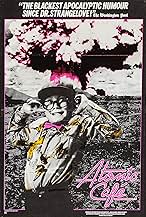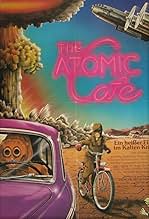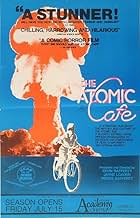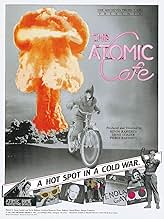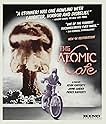AVALIAÇÃO DA IMDb
7,6/10
4,7 mil
SUA AVALIAÇÃO
Perturbadora coleção de filmes de propaganda emitidos pelo governo americano nos anos 40 e 50, destinados a assegurar aos americanos que a bomba atômica não era uma ameaça à sua segurança.Perturbadora coleção de filmes de propaganda emitidos pelo governo americano nos anos 40 e 50, destinados a assegurar aos americanos que a bomba atômica não era uma ameaça à sua segurança.Perturbadora coleção de filmes de propaganda emitidos pelo governo americano nos anos 40 e 50, destinados a assegurar aos americanos que a bomba atômica não era uma ameaça à sua segurança.
- Indicado para 1 prêmio BAFTA
- 2 vitórias e 1 indicação no total
Paul Tibbets
- Self
- (cenas de arquivo)
Harry S. Truman
- Self
- (cenas de arquivo)
- (as President Harry S Truman)
W.H.P. Blandy
- Self - Commander of the Bikini Test
- (cenas de arquivo)
- (as Vice Admiral W.H.P. Blandy)
Brien McMahon
- Self
- (cenas de arquivo)
- (as Sen. Brian McMahon)
Lloyd Bentsen
- Self
- (cenas de arquivo)
- (as Rep. Lloyd Bentsen)
Owen Brewster
- Self
- (cenas de arquivo)
- (as Sen. Owen Brewster)
Julius Rosenberg
- Self
- (cenas de arquivo)
Ethel Rosenberg
- Self
- (cenas de arquivo)
Val Peterson
- Self - Director of Civil Defense
- (cenas de arquivo)
- (as Gov. Val Peterson)
Lyndon B. Johnson
- Self
- (cenas de arquivo)
- (as Sen. Lyndon B. Johnson)
Lewis Strauss
- Self - Chairman, Atomic Energy Commission
- (cenas de arquivo)
- (as Lewis L. Strauss)
George Molan
- Self
- (cenas de arquivo)
- (as Cpl. George Molan)
George Portell
- Self
- (cenas de arquivo)
- (as Tech Sgt. George Portell)
Jerry Schneider
- Self
- (cenas de arquivo)
Sergeant Weaver
- Self
- (cenas de arquivo)
Seymour Melman
- Self - Columbia University
- (cenas de arquivo)
- (as Prof. Seymour Melman)
Mario Salvadori
- Self - Columbia University
- (cenas de arquivo)
- (as Prof. Mario Salvadori)
Nikita Khrushchev
- Self
- (cenas de arquivo)
Avaliações em destaque
Watching Atomic Café is like witnessing history repeating, since the scenes are a compilation of bits and pieces from pre-existing films taken from government and education films from the '40s and '50s. As a compilation film, Atomic Café has resulted in a totally new film that is much richer and more meaningful than the sum of its parts.
Atomic Café, will be more understandable if we are familiar with the roots of its historical material. As a history film, Atomic Café takes us to experience three levels of time. The first is the internal time, the Cold War, communism versus the free world, when propaganda about the atomic bomb was made to persuade the people that only nuclear weapons would protect them from the "Evil Empire". The period of the'Nuclear Free' movement comes next. And thirdly, the present time, when the world is changed but has to face the same irony that still is just as relevant today, the fear of weapons of mass destruction.
In the beginning, the film appears to be a straightforward history of America's development and use of atomic weapons. Historical footage is used to add credibility to the information presented. The power of the bomb is demonstrated by showing dramatic footage of the Trinity test; interviews with Bikini Islanders, and preserved eyewitness congressional testimony of atomic bomb veterans. The impact of the weapon is documented through footage of the bomb victims. The intention is not to make us become objective about certain issues, rather it 'is designed to make us question the nature of the information presented' (Freeman Reading Packet, 108).
The film uses unique techniques. It is like a collage that 'sacrifices the conventions of continuity editing and the sense of a very specific location in time and place that follows from it to explore associations and patterns that involve temporal rhythms and spatial juxtaposition' (Nichols, 102). It is all about editing raw material and splicing segments? of military training films, civil defense films, archive footage, interviews, newsreel material, and fifties music. Many sequences are edited to show the most ridiculous side of the duck-and-cover drills and how naïve the Americans were at that time. To make it more derisive the film shows how the military training films were so amateurishly acted and misleading, such as the scene about the beauty of the H-bomb. I believe that the filmmakers have made their point in choosing all the footage for the film. Perhaps the intention is to challenge and deprive the intended message of the original footage.
If we take a look in more detail, Atomic Café chooses and juxtaposes its various elements to support its point-of-view. One of the examples is the continual references to radio receivers. Perhaps it is a symbol that is used to invoke the idea of the power of mass media. The intention is 'to sensitize us to the danger of uncritical media consumption' (Freeman Reading Packet, 110). It is so ironic to see how people in the '50s could be so passive that they believed in every single thing that they heard about the atom bomb on the radio. We can see from the footage how people became so afraid and escaped to their shelter after hearing that a bomb was launched. Perhaps fear had taken such control of these people that the more frightened they were, the more they were easily persuaded.
I guess it would be a great mistake to ignore the political message that is contained in the film. Maybe for some viewers this is just a gimmick about the Cold War and things that happens during the '50's. But really, Atomic Café gives us an historical perspective for reconsidering the effect of the issues of war, nuclear warfare and weapons of mass destruction.
Atomic Café, will be more understandable if we are familiar with the roots of its historical material. As a history film, Atomic Café takes us to experience three levels of time. The first is the internal time, the Cold War, communism versus the free world, when propaganda about the atomic bomb was made to persuade the people that only nuclear weapons would protect them from the "Evil Empire". The period of the'Nuclear Free' movement comes next. And thirdly, the present time, when the world is changed but has to face the same irony that still is just as relevant today, the fear of weapons of mass destruction.
In the beginning, the film appears to be a straightforward history of America's development and use of atomic weapons. Historical footage is used to add credibility to the information presented. The power of the bomb is demonstrated by showing dramatic footage of the Trinity test; interviews with Bikini Islanders, and preserved eyewitness congressional testimony of atomic bomb veterans. The impact of the weapon is documented through footage of the bomb victims. The intention is not to make us become objective about certain issues, rather it 'is designed to make us question the nature of the information presented' (Freeman Reading Packet, 108).
The film uses unique techniques. It is like a collage that 'sacrifices the conventions of continuity editing and the sense of a very specific location in time and place that follows from it to explore associations and patterns that involve temporal rhythms and spatial juxtaposition' (Nichols, 102). It is all about editing raw material and splicing segments? of military training films, civil defense films, archive footage, interviews, newsreel material, and fifties music. Many sequences are edited to show the most ridiculous side of the duck-and-cover drills and how naïve the Americans were at that time. To make it more derisive the film shows how the military training films were so amateurishly acted and misleading, such as the scene about the beauty of the H-bomb. I believe that the filmmakers have made their point in choosing all the footage for the film. Perhaps the intention is to challenge and deprive the intended message of the original footage.
If we take a look in more detail, Atomic Café chooses and juxtaposes its various elements to support its point-of-view. One of the examples is the continual references to radio receivers. Perhaps it is a symbol that is used to invoke the idea of the power of mass media. The intention is 'to sensitize us to the danger of uncritical media consumption' (Freeman Reading Packet, 110). It is so ironic to see how people in the '50s could be so passive that they believed in every single thing that they heard about the atom bomb on the radio. We can see from the footage how people became so afraid and escaped to their shelter after hearing that a bomb was launched. Perhaps fear had taken such control of these people that the more frightened they were, the more they were easily persuaded.
I guess it would be a great mistake to ignore the political message that is contained in the film. Maybe for some viewers this is just a gimmick about the Cold War and things that happens during the '50's. But really, Atomic Café gives us an historical perspective for reconsidering the effect of the issues of war, nuclear warfare and weapons of mass destruction.
With no narration other than that provided by historical clips, this movie justly states how ludicrous the idea of nuclear war was, and is. The producers of this film spent years going through declassified governmental film archives to find some of the most chilling, and hilarious, footage ever taken. It also tells how the US government screwed over the Bikini Islanders, and has some fine coverage of the spoon-feeding of propaganda to the US public through the 40's and 50's.
A great movie for just a laugh, or for some interesting historical perspective on a unique time in the recent US past. I loved the clip of the guy who invented a lead-lined suit, put it on his son, and then had him try to ride a bike. Could we have possibly been this gullible just a few decades ago? Can you say "duct tape and plastic sheeting"?
Duck and cover everyone!
A great movie for just a laugh, or for some interesting historical perspective on a unique time in the recent US past. I loved the clip of the guy who invented a lead-lined suit, put it on his son, and then had him try to ride a bike. Could we have possibly been this gullible just a few decades ago? Can you say "duct tape and plastic sheeting"?
Duck and cover everyone!
I saw The Atomic Cafe in a theater when it was first released. Someone exclaimed derogatorily as they walked out on it. But I thought it was brilliant. Sort of a sub-genre of documentary, this one had no commentary, narrative or explanations for the material presented. No retroactive interviews with those who were there. It relied 100% on archival materials.
A few years back, I visited the Trinity Site (here in New Mexico) on the 50th anniversary of the first test of the bomb. Quite a few of those who were somehow involved back then and still living turned up for the event. So I did get to hear some hindsight comments. Definitely different than what was being said back then, and such commentary could have really changed the picture.
This is a rare approach, and therefore thought provoking. One can argue that the choice of material, editing and music track impose some interpretation, and there may be something to that. Although it's unlikely that one could turn the story into something really different unless latter-day, hindsight interviews were added to provide a different spin.
Being a "Baby Boomer", I was born during the times depicted in the movie, and have some early memories of them. For those who were alive in that time, it's fascinating to see how it tweaks your memory. I, for one, didn't think deep thoughts about the "duck and cover" drills at school - it was just another thing that got us out of our seats, like fire drills and recess. But it does tweak memory, to bring back things not thought of for many years. Interesting to consider how one's own memory is incomplete, wanders, can be influenced, etc. (Now, re-read Orwell's 1984.)
Brilliant, and disturbing. Interesting to consider in light of current events (spring 2003).
A few years back, I visited the Trinity Site (here in New Mexico) on the 50th anniversary of the first test of the bomb. Quite a few of those who were somehow involved back then and still living turned up for the event. So I did get to hear some hindsight comments. Definitely different than what was being said back then, and such commentary could have really changed the picture.
This is a rare approach, and therefore thought provoking. One can argue that the choice of material, editing and music track impose some interpretation, and there may be something to that. Although it's unlikely that one could turn the story into something really different unless latter-day, hindsight interviews were added to provide a different spin.
Being a "Baby Boomer", I was born during the times depicted in the movie, and have some early memories of them. For those who were alive in that time, it's fascinating to see how it tweaks your memory. I, for one, didn't think deep thoughts about the "duck and cover" drills at school - it was just another thing that got us out of our seats, like fire drills and recess. But it does tweak memory, to bring back things not thought of for many years. Interesting to consider how one's own memory is incomplete, wanders, can be influenced, etc. (Now, re-read Orwell's 1984.)
Brilliant, and disturbing. Interesting to consider in light of current events (spring 2003).
The older boomers would recall the atmosphere of this era very well.
The belief that nuclear weapons were probably going to fall at any time was accepted as a matter of course. Coming out of the carnage and rubble of WW2 perhaps that was to be expected, but the PSAs and political leaders honed that message to suggest it was not much more of a concern than a flock of tornadoes. "Duck and Cover" ads, back yard bomb shelters, Conelrad symbols on the radios (AM of course), public fallout shelters in the bank basements and other related markers were given little thought.
Younger folks would get a kick out of the over-simplified logic and ham-handed propaganda and be astonished to think that we took it for granted that nuclear warfare was just a dirty conventional tactic similar to the London Blitz.
It is an informative film and very entertaining in its odd way. Worth a watch for interested parties.
The belief that nuclear weapons were probably going to fall at any time was accepted as a matter of course. Coming out of the carnage and rubble of WW2 perhaps that was to be expected, but the PSAs and political leaders honed that message to suggest it was not much more of a concern than a flock of tornadoes. "Duck and Cover" ads, back yard bomb shelters, Conelrad symbols on the radios (AM of course), public fallout shelters in the bank basements and other related markers were given little thought.
Younger folks would get a kick out of the over-simplified logic and ham-handed propaganda and be astonished to think that we took it for granted that nuclear warfare was just a dirty conventional tactic similar to the London Blitz.
It is an informative film and very entertaining in its odd way. Worth a watch for interested parties.
10enmussak
For anyone who enjoys a real sense about times in history that they have not lived through, this is an excellent film. I had no idea how the dawning of the atomic age changed American culture. For an interesting continuance of the paranoid atomic era, check out Bowling for Columbine. Both Atomic Cafe and Bowling for Columbine discuss the "Culture of Fear" that is America.
Some of the content in the Atomic Cafe is completely shocking, which serves its purpose as a poignant exposé into one of the darker periods of America's (if not the world's history). A must see. You'll be glued to the screen. 10/10
Some of the content in the Atomic Cafe is completely shocking, which serves its purpose as a poignant exposé into one of the darker periods of America's (if not the world's history). A must see. You'll be glued to the screen. 10/10
Você sabia?
- CuriosidadesThe segment "Duck and Cover" showed how school children were reassured by "Bert the Turtle" that they would survive a nuclear bomb by simply forming a huddle together by the wall of the school-house. "The Atomic Cafe" has been attributed to raising public consciousness of the short film "Duck and Cover" and introducing it to a whole a new generation.
- Citações
Army information film: When not close enough to be killed, the atomic bomb is one of the most beautiful sights in the world.
- Trilhas sonorasWhen the Atom Bomb Fell
Written by Karl Victor Davis and Connecticut 'Harty' Taylor
Performed by Karl and Harty
Courtesy of CBS Records, Inc.
Principais escolhas
Faça login para avaliar e ver a lista de recomendações personalizadas
- How long is The Atomic Cafe?Fornecido pela Alexa
Detalhes
- Data de lançamento
- País de origem
- Central de atendimento oficial
- Idioma
- Também conhecido como
- The Atomic Cafe
- Empresa de produção
- Consulte mais créditos da empresa na IMDbPro
Bilheteria
- Orçamento
- US$ 300.000 (estimativa)
- Faturamento bruto nos EUA e Canadá
- US$ 22.293
- Fim de semana de estreia nos EUA e Canadá
- US$ 4.098
- 5 de ago. de 2018
- Faturamento bruto mundial
- US$ 22.293
- Tempo de duração
- 1 h 26 min(86 min)
- Cor
- Mixagem de som
- Proporção
- 1.33 : 1
Contribua para esta página
Sugerir uma alteração ou adicionar conteúdo ausente


